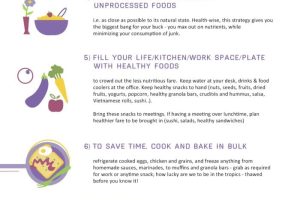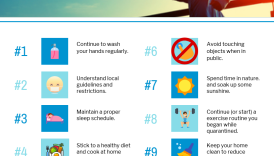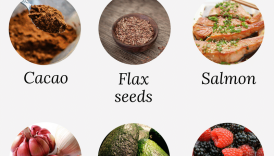Simple Steps to a Healthier You: A Comprehensive Guide

Importance of Health
Health is often deemed the most valuable asset one can possess. Without it, personal happiness, productivity, and confidence can significantly diminish. Just think about how much more you enjoy life when you feel good and energetic! As someone who has navigated the ups and downs of health journeys, the importance of maintaining wellness cannot be overstated. Prioritizing health leads to:
- Simple Steps to a Healthier You: A Comprehensive Guide
- Importance of Health
- Overview of the Guide
- Nutrition
- Balanced Diet
- Hydration Tips
- Exercise
- Types of Exercise
- Creating a Workout Routine
- Sleep
- Importance of Sleep
- Tips for Better Sleep
- Stress Management
- Understanding Stress
- Stress-Relief Techniques
- Mental Health
- Mental Well-being
- Mindfulness Practices
- Hygiene
- Personal Hygiene
- Home Hygiene Tips
- Routine Health Check-ups
- Importance of Regular Check-ups
- Common Tests to Monitor Health
- Healthy Habits
- Building Healthy Habits
- Breaking Bad Habits
- Social Connections
- Importance of Social Connections
- Nurturing Relationships
- Symptom Recognition
- Common Health Symptoms
- When to Seek Medical Help
- Healthy Aging
- Aging Gracefully
- Tips for Senior Health
- XIII. Mind-Body Connection
- Holistic Health Approach
- Practices for Mind-Body Wellness
- XIV. Resources for Health
- Finding Reliable Health Information
- Seeking Professional Help
- XVI. Conclusion
- Recap of Key Points
- Encouragement for a Healthier Lifestyle
- Increased energy levels
- Improved mental clarity
- Better emotional stability
- Enhanced quality of life
By making informed decisions today, individuals can pave the way for a healthier tomorrow.
Overview of the Guide
This guide serves as a comprehensive resource for anyone seeking to enhance their health and well-being. It explores practical aspects of nutrition, exercise, sleep, and stress management while addressing mental health, hygiene, and the significance of social connections. Each section provides actionable tips and relatable examples, making it easier to integrate healthy habits into daily routines. Whether you’re a health enthusiast or just starting your journey, this guide is tailored to empower you with knowledge and encourage a more vibrant life.
Nutrition
Balanced Diet
Eating a balanced diet is key to nourishing the body and maintaining optimal health. It’s not just about consuming fewer calories; it’s about consuming the right nutrients. Personally, I’ve noticed a significant difference in my energy levels when I focus on including a variety of foods on my plate. A balanced meal typically includes:
- Fruits and Vegetables: Aim for a rainbow on your plate.
- Whole Grains: Choose brown rice or whole grain bread over white.
- Lean Proteins: Incorporate chicken, fish, legumes, or tofu.
- Healthy Fats: Avocado, nuts, and olive oil can make meals satisfying.
This approach helps ensure you’re getting diverse vitamins and minerals.
Hydration Tips
Hydration is another crucial aspect of nutrition that is often overlooked. Water plays an essential role in digestion, absorption, and even cognitive function. I remember days when I felt sluggish, only to realize I hadn’t drunk enough water! Here are a few hydration tips:
- Set Reminders: Use your phone to remind you to drink water regularly.
- Flavor Your Water: Add slices of lemon or cucumber for a refreshing taste.
- Carry a Water Bottle: Keep a reusable bottle on hand to track your intake easily.
- Eat Water-Rich Foods: Incorporate fruits like watermelon and cucumber into your meals.
By prioritizing nutrition and hydration, individuals can elevate their health and well-being significantly.
Exercise
Types of Exercise
Engaging in various types of exercise is essential for overall fitness and can make your routine enjoyable. Personally, I’ve found that mixing different activities keeps me motivated and challenged. Here are the main types of exercise to consider:
- Cardiovascular Exercise: Examples include running, cycling, and swimming, which elevate heart rate and improve endurance.
- Strength Training: Using weights or resistance bands helps build muscle and boost metabolism.
- Flexibility and Balance: Yoga and Pilates focus on stretching and core strength, improving flexibility and balance.
- Recreational Activities: Sports, dancing, or hiking are fun ways to incorporate movement into your life.
Creating a Workout Routine
Crafting a balanced workout routine is pivotal to sticking with an exercise plan. When I first began my fitness journey, I started by setting achievable goals. Here’s a basic approach to creating your routine:
- Set Clear Goals: Determine what you want to accomplish—whether it’s weight loss, muscle gain, or simply staying active.
- Schedule Sessions: Dedicate specific days and times for workouts to establish consistency.
- Mix It Up: Include a combination of cardio, strength training, and flexibility exercises.
- Listen to Your Body: Adjust your routine according to your energy levels and any discomfort.
By incorporating different types of exercise and developing a thoughtful routine, individuals can enhance their physical well-being and enjoy the journey towards fitness.
Sleep
Importance of Sleep
Sleep is often underestimated, yet it plays a crucial role in our overall health and well-being. Personally, I’ve experienced the impact of a good night’s rest versus a restless one; my mood, productivity, and focus can drastically change. Quality sleep is essential for:
- Cognitive Function: It enhances memory and decision-making abilities.
- Emotional Balance: A lack of sleep can lead to irritability and increased stress.
- Physical Health: Adequate rest helps with muscle recovery and immune function.
In short, prioritizing sleep can significantly enhance various aspects of life.
Tips for Better Sleep
If you’re struggling to get quality sleep, consider implementing these simple tips into your routine:
- Establish a Sleep Schedule: Go to bed and wake up at the same time every day, even on weekends.
- Create a Relaxing Nighttime Routine: Engage in calming activities like reading or meditating before bed.
- Limit Screen Time: Avoid screens at least an hour before sleep to reduce blue light exposure.
- Optimize Your Sleep Environment: Make sure your bedroom is cool, dark, and quiet.
By focusing on these strategies, individuals can improve their sleep hygiene, leading to more restful nights and energized days.
Stress Management
Understanding Stress
Stress is an inevitable part of life, but understanding its sources can empower individuals to manage it effectively. When I faced deadlines and commitments, I felt the weight of stress impacting my daily life. Stress can arise from various factors, such as:
- Work Pressure: Job-related responsibilities can cause significant anxiety.
- Personal Relationships: Conflicts or demands from loved ones may lead to emotional strain.
- Life Changes: Major transitions like moving or changing jobs often trigger stress.
Recognizing these triggers is the first step toward effective management.
Stress-Relief Techniques
Implementing stress-relief techniques can make a world of difference in daily life. Here are some helpful practices that I’ve found beneficial:
- Deep Breathing Exercises: Taking a few moments to focus on your breath can help calm the mind.
- Physical Activity: Engaging in exercise releases endorphins, which improve mood.
- Mindfulness and Meditation: Setting aside time for mindfulness practices can reduce anxiety and enhance focus.
- Journaling: Writing down thoughts and feelings helps process emotions and identify stressors.
By incorporating these techniques into daily routines, individuals can significantly reduce stress and cultivate a more balanced and fulfilling life.
Mental Health
Mental Well-being
Mental well-being is just as important as physical health. It’s the foundation for how we think, feel, and act daily. Personally, I’ve noticed that prioritizing my mental health has improved my overall quality of life. Good mental well-being includes:
- Positive Relationships: Building connections with others can create a support system.
- Resilience: The ability to cope with stress and bounce back from setbacks is crucial.
- Self-acceptance: Embracing one’s strengths and acknowledging weaknesses fosters a healthier self-image.
By focusing on these aspects, individuals can cultivate a more fulfilling life.
Mindfulness Practices
Incorporating mindfulness practices into daily routines can enhance mental well-being. When I implemented mindfulness techniques, I found greater peace and clarity in my thoughts. Here are some effective practices to consider:
- Meditation: Spending just a few minutes in meditation can ground you and reduce anxiety.
- Gratitude Journaling: Writing down things you’re thankful for can shift focus toward the positive.
- Mindful Eating: Paying attention to your eating experience can enhance enjoyment and awareness of food choices.
- Walking in Nature: Taking a stroll outside, focusing on your surroundings, can provide a mental reset.
By incorporating these mindfulness practices, individuals can nurture their mental health and foster a more balanced, peaceful state of mind.
Hygiene
Personal Hygiene
Maintaining good personal hygiene is essential for physical health and mental well-being. I’ve realized that a consistent hygiene routine not only keeps me feeling fresh but also boosts my confidence. Key aspects of personal hygiene include:
- Regular Hand Washing: This is crucial for preventing the spread of illness. Always wash your hands before eating and after using the restroom.
- Daily Showering: Keeping the body clean helps remove sweat and dirt, contributing to a pleasant odor.
- Oral Care: Brushing and flossing daily maintain dental health and fresh breath.
Prioritizing personal hygiene can significantly enhance one’s quality of life.
Home Hygiene Tips
Just as personal hygiene is important, maintaining cleanliness at home creates a healthy environment. I’ve found that a tidy space promotes a calmer mind. Here are some effective home hygiene tips:
- Regular Cleaning Schedule: Establish a routine for dusting, vacuuming, and mopping to keep dirt at bay.
- Declutter Regularly: Reducing clutter can enhance mental clarity and make cleaning easier.
- Sanitize High-Touch Areas: Don’t forget to disinfect surfaces like doorknobs, light switches, and countertops regularly.
- Air Quality: Open windows when possible and use air purifiers to improve indoor air quality.
By implementing these personal and home hygiene practices, individuals can foster a healthier mindset and living space, contributing to overall well-being.
Routine Health Check-ups
Importance of Regular Check-ups
Routine health check-ups are essential for maintaining overall health and preventing serious illnesses. I learned this firsthand after experiencing a minor health scare that could have been avoided with regular visits to my doctor. Regular check-ups help:
- Detect Health Issues Early: Early detection often leads to more effective treatment and better outcomes.
- Monitor Existing Conditions: For those with chronic diseases, regular visits ensure management plans are effective.
- Promote Preventive Care: Health screenings and vaccinations can ward off future health issues.
Prioritizing these visits can empower individuals to take charge of their health proactively.
Common Tests to Monitor Health
During routine check-ups, healthcare providers often recommend various tests to monitor health. Here are some common tests to consider:
- Blood Pressure Check: Essential for detecting hypertension and cardiovascular risks.
- Cholesterol Tests: Monitoring cholesterol levels is key for heart health.
- Blood Sugar Screening: This test can help identify prediabetes or diabetes early.
- Body Mass Index (BMI): A simple measurement that helps assess weight in relation to height.
By incorporating regular check-ups and essential tests into their health routine, individuals can stay informed about their health and make proactive choices to enhance their quality of life.
Healthy Habits
Building Healthy Habits
Building healthy habits can significantly enhance quality of life, and I’ve found that starting small makes a big difference. It’s about consistency and commitment. Here’s how to cultivate healthy habits:
- Set Clear Goals: Define what you want to achieve, whether it’s drinking more water or incorporating daily exercise.
- Start Small: Focus on manageable changes, like adding a five-minute walk to your day, and gradually increase it.
- Track Progress: Use a journal or an app to monitor your journey and celebrate small victories.
By focusing on gradual improvements, you can create lasting and positive changes in your life.
Breaking Bad Habits
Breaking bad habits can be challenging, but awareness and perseverance are key. I remember struggling to quit late-night snacking, but these strategies helped:
- Identify Triggers: Recognize situations that prompt the habit, such as stress or boredom.
- Replace the Habit: Substitute the bad habit with a healthier option, like having a piece of fruit instead of junk food.
- Seek Support: Engaging friends or family members can provide motivation and accountability.
With dedication and the right approach, individuals can successfully break bad habits and pave the way for a healthier lifestyle.
Social Connections
Importance of Social Connections
Social connections play a vital role in our well-being and overall health. I’ve personally experienced the boost in mood and motivation that comes from spending time with friends and family. Strong relationships can lead to:
- Increased Happiness: Quality time spent with others fosters joy and reduces feelings of loneliness.
- Emotional Support: Having a network of supportive individuals provides comfort during challenging times.
- Improved Health Outcomes: Research shows that social interactions can lead to lower stress levels and even a healthier heart.
Fostering these connections is essential for a fulfilling life.
Nurturing Relationships
Nurturing relationships takes intention and effort, yet the rewards are worth it. I’ve learned that small gestures can make a significant impact. Here are some effective ways to cultivate strong connections:
- Communicate Regularly: Reach out to friends and family through calls, texts, or even handwritten notes.
- Plan Activities Together: Shared experiences, like cooking a meal or going for a hike, strengthen bonds.
- Be a Good Listener: Show genuine interest in others’ lives and support their aspirations.
- Express Gratitude: Acknowledging and appreciating others can deepen relationships.
By actively nurturing social connections, individuals can enrich their lives and enhance their mental well-being, leading to a more connected and fulfilling existence.
Symptom Recognition
Common Health Symptoms
Recognizing common health symptoms is crucial for understanding when something might be off with your body. I’ve found it helpful to be mindful of how I feel daily. Some common symptoms to watch for include:
- Fatigue: Constant tiredness that doesn’t improve with rest can indicate underlying issues.
- Persistent Cough: A cough lasting more than a few weeks should not be ignored.
- Changes in Appetite: Significant weight loss or gain can signal health concerns.
- Chest Pain: This is a serious symptom that warrants immediate attention.
Being aware of these signs can aid in timely self-assessment.
When to Seek Medical Help
Knowing when to seek medical help can be daunting but is crucial for health maintenance. I’ve learned that it’s better to err on the side of caution. Here are some guidelines to consider:
- Severe or Prolonged Symptoms: If symptoms persist for more than a few days or worsen, consult a healthcare professional.
- Difficulty Breathing: This is a critical emergency and requires immediate attention.
- Signs of Infection: Fever, chills, or unexplained pain can indicate infection needing treatment.
- Mental Health Concerns: If feelings of anxiety, depression, or despair become overwhelming, seeking help is essential.
By recognizing symptoms and understanding when medical help is necessary, individuals can proactive manage their health and well-being effectively.
Healthy Aging
Aging Gracefully
Aging gracefully is about embracing the changes that come with time while maintaining a positive outlook on life. I’ve observed that a mindset focused on growth and resilience contributes greatly to well-being in later years. Aging gracefully involves:
- Self-Acceptance: Embracing oneself, including the changes in appearance and ability, fosters a positive self-image.
- Continued Learning: Engaging in new hobbies or interests keeps the mind active and promotes cognitive health.
- Staying Active: Regular physical activity, even simple walks, can enhance mobility and vitality.
By prioritizing these aspects, individuals can navigate the aging process with grace and dignity.
Tips for Senior Health
Maintaining health as we age requires intention and care. I’ve learned from older family members that simple adjustments can yield significant benefits. Here are some tips for promoting senior health:
- Balanced Nutrition: Focus on nutrient-dense foods like vegetables, whole grains, and lean proteins to support overall health.
- Regular Check-ups: Routine medical appointments help monitor health and catch potential issues early.
- Social Engagement: Staying connected with friends and family combats loneliness and promotes mental well-being.
- Cognitive Exercises: Activities like puzzles or reading can enhance mental sharpness.
By adopting these tips and fostering a healthy lifestyle, seniors can embrace aging with joy and vitality, making the most of each year.
XIII. Mind-Body Connection
Holistic Health Approach
Understanding the mind-body connection is fundamental to achieving holistic health, a journey I’ve found enriching both physically and emotionally. Holistic health emphasizes the interplay between mental, emotional, and physical well-being. This approach recognizes that:
- Mental State Influences Physical Health: Stress or anxiety can lead to physical ailments, like headaches or digestive issues.
- Physical Health Impacts Mood: A regular exercise routine not only strengthens the body but also elevates mood and reduces anxiety.
By embracing this interconnectedness, individuals can promote comprehensive health and wellness.
Practices for Mind-Body Wellness
Incorporating practices that nurture the mind-body connection can transform daily life. I’ve discovered several effective strategies that contribute to overall wellness:
- Mindfulness Meditation: Spending just a few minutes daily in meditation helps center thoughts and reduce stress.
- Yoga and Tai Chi: These practices combine movement with mindfulness, enhancing flexibility and promoting inner peace.
- Deep Breathing Exercises: Taking time to focus on breath can calm the mind and reduce anxiety.
- Journaling: Reflecting on thoughts and emotions helps process feelings and increases self-awareness.
By integrating these mind-body practices into daily life, individuals can experience enhanced wellness and a greater sense of balance in their lives.
XIV. Resources for Health
Finding Reliable Health Information
In today’s fast-paced digital world, finding reliable health information is crucial but can often be overwhelming. I’ve personally navigated this landscape by focusing on trusted sources. Here are tips to ensure the information you gather is credible:
- Look for Reputable Websites: Websites ending in .gov, .edu, or from recognized health organizations like the CDC or WHO are usually trustworthy.
- Check Authors’ Credentials: Verify that the information is written or reviewed by qualified healthcare professionals.
- Avoid Sensationalism: Be cautious of sites that promise quick fixes or miracle cures; reliable sources promote evidence-based practices.
These steps can significantly enhance your ability to access accurate health information.
Seeking Professional Help
While self-education is valuable, sometimes professional help is essential for navigating health concerns. I learned this firsthand after trying to manage a persistent issue on my own. Here are some tips for seeking professional assistance:
- Know When to Visit a Doctor: Persistent symptoms, mental health struggles, or significant lifestyle changes should prompt a consultation.
- Get Referrals: Ask friends or family for recommendations for trusted healthcare providers.
- Prepare for Your Appointment: Write down your symptoms and any questions you have, so you maximize your time with the professional.
By utilizing reliable resources and seeking professional help when needed, individuals can confidently manage their health and well-being.
XVI. Conclusion
Recap of Key Points
As we wrap up this comprehensive guide on health and wellness, it’s essential to reflect on the key points we’ve discussed. From understanding the importance of nutrition and exercise to recognizing the significance of mental health and social connections, each element contributes to our overall well-being. We explored practices for managing stress, the benefits of routine check-ups, and the vital role that both hygiene and self-care play in leading a healthier life.
- Nutrition: Prioritize a balanced diet with hydration.
- Exercise: Incorporate different types of physical activity into daily routines.
- Mental Health: Embrace the mind-body connection and nurture relationships.
Encouragement for a Healthier Lifestyle
Remember, embarking on a healthier lifestyle is a journey that unfolds over time. I’ve experienced ups and downs along the way, but each step, no matter how small, contributes to overall health. Here are a few encouraging thoughts to keep in mind:
- Start Small: Focus on one or two changes you can easily incorporate.
- Stay Consistent: Consistency is key when building healthy habits.
- Celebrate Progress: Acknowledge and celebrate the small victories throughout your journey.
With commitment and a positive mindset, anyone can cultivate a healthier lifestyle, leading to a more vibrant and fulfilling life. Here’s to your health and wellness journey!





